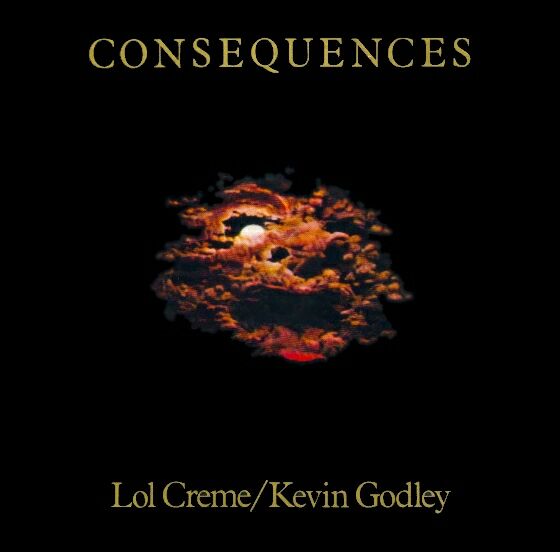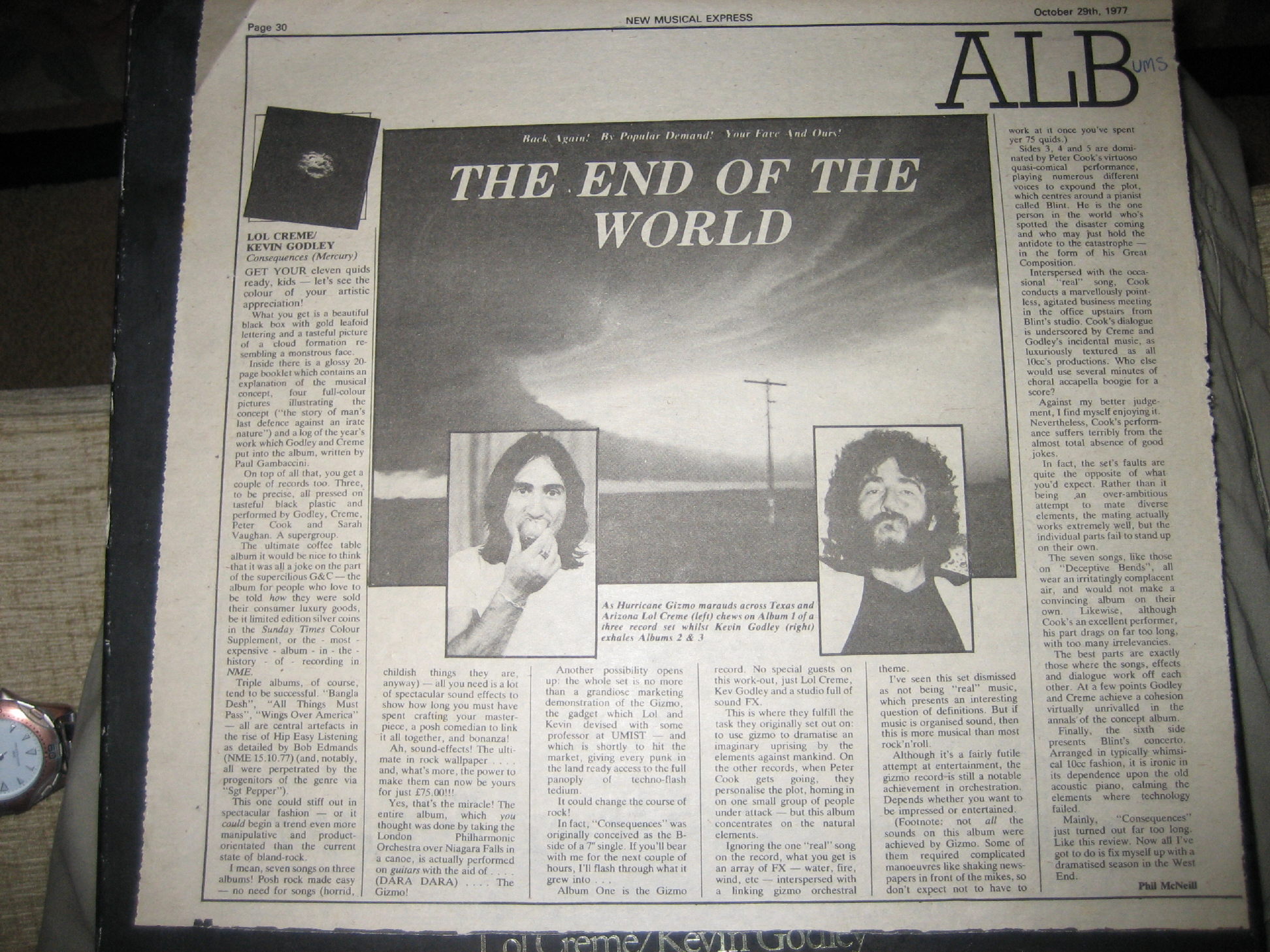
NME, 1977
New Musical Express (NME), 29th October 1977

Back Again! By Popular Demand! Your Fave And Ours!
THE END OF THE WORLD
Get your eleven quids ready, kids - let's see the colour of your artistic appreciation!
What you get us a beautiful black box with gold leafoid lettering and a tasteful picture of a cloud formation resembling a monstrous face.
Inside there is a glossy 20-page booklet which contains an explanation of the musical concept, four full-colour pictures illustrating the concept ('the story of man's last defence against an irate nature') and a log of the year's work which Godley and Creme put into the album, written by Paul Gambaccini.
On top of all that, you get a couple of records too. Three, to be precise, all pressed on tasteful black plastic and performed by Godley, Creme, Peter Cook and Sarah Vaughan. A supergroup.
The ultimate coffee table album. It would be nice to think that it was all a joke on the part of the supercilious G&C - the album for people who love to be told how they were sold their consumer luxury goods, be it limited edition silver coins in the Sunday Times Colour Supplement, or the most-expensive-album-in-the-history-of-recording in NME.
Triple albums, of course, tend to be successful. 'Bangla Desh', 'All Things Must Pass', 'Wings Over America' - all are central artefacts in the rise of Hip Easy Listening as detailed by Bob Edmands (NME 15.10.77) (and, notably, all were perpetrated by the progenitors of the genre via 'Sgt Pepper'). This one could stiff out in spectacular fashion - or it could begin a trend even more manipulative and product-orientated than the current state of bland-rock.
I mean, seven songs on three albums! Posh rock made easy - no need for songs (horrid, childish things they are, anyway) - all you need is a lot of spectacular sound effects to show how long you must have spent crafting your masterpiece, a posh comedian to link it all together, and bonanza!
Ah, sound effects! The ultimate in rock wallpaper... and, what's more, the power to make them can now be yours for just £75.00!!!
Yes, that's the miracle! The entire album, which you thought was done by taking the London Philharmonic Orchestra over Niagra Falls in a canoe, is actually performed on guitars with the aid of... (DARA DARA) ... The Gizmo!
Another possibility opens up: the whole set is no more than a grandiose marketing demonstration of the Gizmo, the gadget which Lol and Kevin devised with some professor at UMIST - and which is shortly to hit the market, giving every punk in the land ready access to the full panoply of techno-flash tedium.
It could change the course of rock!
In fact, 'Consequences' was originally conceived as the B-side of a 7" single. If you'll bear with me for the next couple of hours, I'll flash through what it grew into...
Album One is the Gizmo record. No special guests on this work-out, just Lol Creme, Kev Godley and a studio full of sound FX.
This is where they fulfil the task they originally set out on: to use gizmo to dramatise an imaginary uprising by the elements against mankind. On the other records, when Peter Cook gets going, they personalise the plot, homing in on one small group of people under attack - but this album concentrates on the natural elements.
Ignoring the one 'real' song on the record, what you get is an array of FX - water, fire, wind, etc - interspersed with a linking gizmo orchestral theme.
I've seen this set dismissed as not being 'real' music, which presents an interesting question of definitions. But if music is organised sound, then this is more musical than most rock'n'roll.
Although it's a fairly futile attempt at entertainment, the gizmo record is still a notable achievement in orchestration. Depends whether you want to be impressed or entertained.
(Footnote: not all the sounds on this album were achieved by Gizmo. Some of them required complicated manoeuvres like shaking newspapers in front of the mikes, so don't expect not to have to work at it once you've spent yer 75 quids.)
Sides 3, 4 and 5 are dominated by Peter Cook's virtuoso quasi-comical performance, playing numerous different voices to expound the plot, which centres around a pianist called Blint. He is the one person in the world who's spotted the disaster coming and who may just hold the antidote to the catastrophe - in the form of his Great Composition.
Interspersed with the occasional 'real' song, Cook conducts a marvellously pointless, agitated business meeting in the office upstairs from Blint's studio. Cook's dialogue is underscored by Creme and Godley's incidental music, as luxuriously textured as all 10cc's productions. Who else would use several minutes of accapella boogie for a score?
Against my better judgement, I find myself enjoying it. Neverthleless, Cook's performance suffers terribly from the almost total absence of good jokes.
In fact, the set's faults are quite the opposite of what you'd expect. Rather than it being an over-ambitious attempt to mate diverse elements, the mating actually works extremely well, but the individual parts fail to stand up on their own.
The seven songs, like those on 'Deceptive Bends', all wear an irritatingly complacent air, and would not make a convincing album on their own. Likewise, although Cook's an excellent performer, his part drags on far too long, with too many irrelevancies.
The best parts are exactly those where the songs, effects and dialogue work off each other. At a few points Godley and Creme achieve a cohesion virtually unrivalled in the annals of the concept album.
Finally, the sixth side prsesents Blint's concerto. Arranged in typically whimsical 10cc fashion, it is ironic in its dependence upon the old acoustic piano, calming the elements where technology failed.
Mainly, 'Consequences' just turned out far too long. Like this review. Now all I've got to do is fix myself up with a dramatised season in the West End.
Phil McNeil